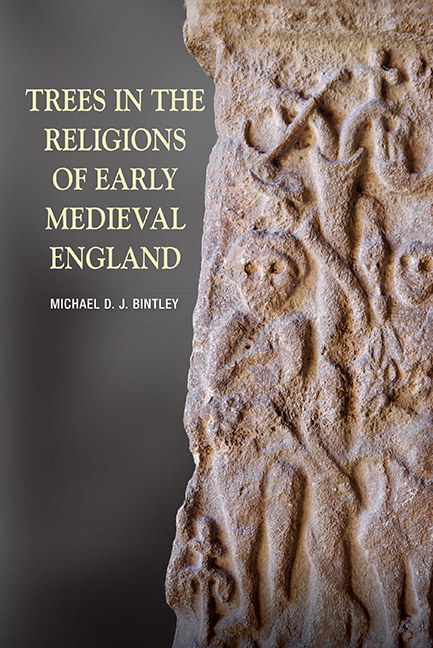Book contents
- Frontmatter
- Contents
- List of Illustrations
- Acknowledgements
- Introduction
- 1 Holy Trees and Inculturation in the Conversion Period
- 2 Anglo-Saxon Holy Trees and their Northern European Counterparts
- 3 Rewriting the Holy Rood in Anglo-Saxon Spiritual History
- 4. The Human Forest: People and Trees in Early Medieval England and Scandinavia
- Summary
- Bibliography
- Index
- Anglo-Saxon Studies
4. - The Human Forest: People and Trees in Early Medieval England and Scandinavia
Published online by Cambridge University Press: 11 June 2021
- Frontmatter
- Contents
- List of Illustrations
- Acknowledgements
- Introduction
- 1 Holy Trees and Inculturation in the Conversion Period
- 2 Anglo-Saxon Holy Trees and their Northern European Counterparts
- 3 Rewriting the Holy Rood in Anglo-Saxon Spiritual History
- 4. The Human Forest: People and Trees in Early Medieval England and Scandinavia
- Summary
- Bibliography
- Index
- Anglo-Saxon Studies
Summary
The discussion so far has focused on the tree as a sacred symbol and an object of veneration in the Christian and pre-Christian beliefs of the Anglo-Saxons. In this chapter I consider the more personal relationship between the bodies of humans and trees that can be found in Old English and Old Norse literature. The methodology of this chapter is more obviously rooted in the comparative method, making use of prominent motifs in Old Norse literature to illuminate the remains of similar tropes in Old English. There are numerous instances in Eddic and skaldic poetry where people are explicitly referred to as trees and other plants, often in order to emphasise ties of kinship, or to accentuate some feature of their personality or social position, in addition to anthropogonic myths connected with wood and trees. All of this is considered alongside evidence in Old English literature for the existence of similar concepts, with a focus on the bodily relationships between humans and trees, and upon later references to the Anglo-Saxons as a great forest of human beings.
Tree people in Old Norse poetry
In his recent study, Plants as Persons: A Philosophical Botany, Matthew Hall argues that modern Western concepts of the relationship betweens humans, animals and plants are largely the product of a traditions stemming from Classical and Judaeo-Christian thought. Hall's argument, broadly speaking, is that this tradition is profoundly anthropocentric (at its worst), and emphatically zoocentric even at its best, with some notable but less than influential exceptions. Hall suggests that recognising this influence on Western understanding of the relationships between people and plants may play a significant role in redressing many of the ongoing and future ecological challenges that humans face in the twenty-first century. In many ways this is in keeping with the deep historical frameworks discussed in the introduction to this book, which aim to highlight changes, developments and repeated patterns in human cultures over periods that extend far beyond the traditional reach of much literary and historical scholarship. It also follows the renewed attention being given to the agency of non-humans. One of Hall's most adventurous suggestions is that the belief systems of those pre-Christian peoples who were not converted until a comparatively late date in the first millennium, namely the people of the British Isles, modern Germany, Scandinavia and their environs, exhibited a different relationship with plants from their southern European counterparts.
- Type
- Chapter
- Information
- Trees in the Religions of Early Medieval England , pp. 129 - 152Publisher: Boydell & BrewerPrint publication year: 2015
- 1
- Cited by



